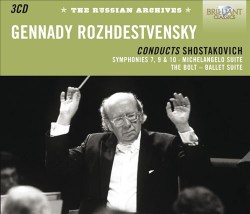|

|
Support us
financially by purchasing this disc from
|
|
|
|
|
|
|
|
Dimitri SHOSTAKOVICH (1906-1975)
Symphony No. 7 in C, Op.60 Leningrad [68.31]1
Symphony No. 9 in E flat, Op.45 [25.38]2
Symphony No. 10 in E minor, Op.93 [50.41]3
The Bolt: Ballet Suite [15.04]4
Michelangelo Suite, Op.145 [40.37]4
Evgeny Nesterenko (baritone)3
USSR State TV and Radio Symphony Orchestra1,3/Gennady Rozhdestvensky
USSR Ministry of Culture Symphony Orchestra2,4/Gennady Rozhdestvensky
rec. Moscow, 8 January 19681, 20 April 19763,
10 April 19824, 21 December 19822
BRILLIANT CLASSICS 9273 [3 CDs: 68.31 + 66.31 + 65.49]
In the early days of CD, and before the fall of the Iron Curtain,
Gennady Rozhdestvensky recorded the complete Shostakovich symphonies
and these were issued on the long-defunct Olympia label. These recordings
were only challenged in the catalogues at that time by Bernard Haitink’s
Decca cycle, and they formed a startling contrast to Haitink’s
much less characterful and more symphonic approach. Rozhdestvensky
brought out all the puckish elements in Shostakovich’s writing,
aided and abetted by a Russian studio recording that closely microphoned
all the individual instruments and emphasised their contributions
in a highly artificial and sometimes startlingly manner. After the
demise of Olympia these recordings drifted in and out of the catalogues
in a number of guises, but currently appear to be once again unavailable.
On initial inspection it would seem that this 3 CD set would be a
further reissue of those 1980s recordings, but although some of the
performances are again given by the USSR Ministry of Culture Symphony
Orchestra these are not the same versions as before. They are derived
from concert performances and also including a number of readings
by Rozhdestvensky’s earlier orchestra the State TV and Radio
Symphony Orchestra with whom he made a number of recordings in the
1970s. The actual style of the performances however remain much as
in Rozhdestvensky’s studio readings: lively and sometimes entertainingly
eccentric, with for example a very slow approach to the infamous ‘march’
section in the first movement of the Leningrad Symphony. The
recordings are however very different in the approach of the engineers.
The Ministry of Culture Symphony Orchestra concert recordings are
much more straightforward than in the contemporary studio readings,
with none of the spotlighting of individual lines that many may find
irritating in the Olympia issues or their successors. The supposed
portrait of Stalin in the second movement of the Tenth Symphony has
all the demonic fire that Rozhdestvensky captured in his studio version,
but the orchestra is given a more natural concert hall acoustic which
lacks the artificiality of the studio balance.
The older recordings with the TV and Radio orchestra, however, are
rather less successful, lacking the sheer punch of the sound that
Rozhdestvensky obtained in the studio. The recording quality in the
Leningrad Symphony is decidedly inferior to Rozhdestvensky’s
later version with the Ministry of Culture players. The recording
of the Michelangelo Suite with Evgeny Nesterenko is nevertheless
valuable, because these songs have never subsequently been re-recorded
by the conductor. This suite was Shostakovich’s last major orchestral
work, and it has all the heavy solemnity of the death-laden songs
in the Fourteenth Symphony. It has not been much favoured on disc,
and the only currently available rivals to this release are a 2006
Chandos
issue sung by Ildar Abdrazakov and a version from Anatoli Kotscherga
on Capriccio.
The latter is very much better recorded and also considerably better
played by the BBC Philharmonic under Gianandrea Noseda. Nesterenko’s
singing of these pieces is really something rather special - it was
he who gave the first performance of the suite in its orchestral guise
some six months before this recording was made. This is sufficient
to make one overlook the decidedly inferior quality of the actual
sound captured by the engineers, with the voice very forwardly placed.
Nesterenko’s plangent declamation of the words has a sense of
black foreboding which almost makes one forgive the fact that the
booklet supplies no texts or translations.
Chandos also made a recording of the complete ballet The Bolt
with Rozhdestvensky conducting the Royal Stockholm orchestra (CHAN9343(2)).
This indeed remains the only current CD recording of the complete
score. He has great fun with this suite, however, and the Russian
players are decidedly more idiomatic than their Swedish counterparts.
The recording is crisper, too.
We really need to have Rozhdestvensky’s complete studio cycle
of the symphonies restored to circulation, but many listeners may
nevertheless prefer the more natural sound of the orchestra as captured
here in the Ninth and Tenth Symphonies. The less satisfactorily engineered
Leningrad Symphony is however decidedly outclassed by the later
studio recording, and the suite from The Bolt is lightweight
even if welcome. No, this set is principally valuable for the Nesterenko
performance of the Michelangelo Suite, and it would be welcome
if this could be released separately. However, even here, still more
desirable would be a reissue of the studio recording Nesterenko made
in 1977 with the Moscow Chamber Orchestra under Rudolf Barshai, which
does not appear to have been available for many years.
Paul Corfield Godfrey
Masterwork Index: Shostakovich Symphony
7 ~~ Symphony 9
~~ Symphony 10
|



 All Nimbus reviews
All Nimbus reviews








